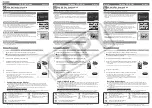
254
Chapter 12: Building Custom CFXAPI Tags
To create a Java CFX tag:
1
Create a new source file in your editor with the following code:
import com.allaire.cfx.* ;
public class MyHelloColdFusion implements CustomTag {
public void processRequest( Request request, Response response )
throws Exception {
String strName = request.getAttribute( "NAME" ) ;
response.write( "Hello, " + strName ) ;
}
}
2
Save the file as MyHelloColdFusion.java in the
web_root
/WEB_INF/classes directory.
3
Compile the java source file into a class file using the Java compiler. If you are using the
command-line tools bundled with the JDK, use the following command line, which you
execute from within the classes directory:
javac -classpath
cf_root
\lib\cfx.jar MyHelloColdFusion.java
Note:
The previous command works only if the Java compiler (
javac.exe
) is in your path. If it is
not in your path, specify the fully qualified path; for example, c:\jdk1.3.1_01\bin\javac on Windows
or /usr/java/bin/javac on UNIX.
If you receive errors during compilation, check the source code to make sure you entered it
correctly. If no errors occur, you successfully wrote your first Java CFX tag. For information on
using your new tag in a ColdFusion page, see
“Calling the CFX tag from a ColdFusion page”
on page 254
.
Calling the CFX tag from a ColdFusion page
You call Java CFX tags from within ColdFusion pages by using the name of the CFX tag that is
registered on the ColdFusion MX Administrator CFX tags page. This name should be the prefix
cfx_
followed by the class name (without the .class extension).
To register a Java CFX tag in the ColdFusion MX Administrator:
1
On the ColdFusion MX Administrator Server tab, select
Extensions > CFX Tags
to open the
CFX Tags page.
2
Click Register Java CFX.
3
Enter the tag name (for example,
cfx_MyHelloColdFusion
).
4
Enter the class name without the .class extension (for example,
MyHelloColdFusion
).
5
(Optional) Enter a description.
6
Click Submit.
You can now call the tag from a ColdFusion page.
To call a CFX tag from a ColdFusion page
:
1
Create a ColdFusion page (.cfm) in your editor with the following content to call the
HelloColdFusion custom tag:
<html>
<body>
<cfx_MyHelloColdFusion NAME="Les">
</body>
</html>
Summary of Contents for ColdFusion MX
Page 1: ...Developing ColdFusion MX Applications...
Page 22: ...22 Contents...
Page 38: ......
Page 52: ...52 Chapter 2 Elements of CFML...
Page 162: ......
Page 218: ...218 Chapter 10 Writing and Calling User Defined Functions...
Page 250: ...250 Chapter 11 Building and Using ColdFusion Components...
Page 264: ...264 Chapter 12 Building Custom CFXAPI Tags...
Page 266: ......
Page 314: ...314 Chapter 14 Handling Errors...
Page 344: ...344 Chapter 15 Using Persistent Data and Locking...
Page 349: ...About user security 349...
Page 357: ...Security scenarios 357...
Page 370: ...370 Chapter 16 Securing Applications...
Page 388: ...388 Chapter 17 Developing Globalized Applications...
Page 408: ...408 Chapter 18 Debugging and Troubleshooting Applications...
Page 410: ......
Page 426: ...426 Chapter 19 Introduction to Databases and SQL...
Page 476: ...476 Chapter 22 Using Query of Queries...
Page 534: ...534 Chapter 24 Building a Search Interface...
Page 556: ...556 Chapter 25 Using Verity Search Expressions...
Page 558: ......
Page 582: ...582 Chapter 26 Retrieving and Formatting Data...
Page 668: ......
Page 734: ...734 Chapter 32 Using Web Services...
Page 760: ...760 Chapter 33 Integrating J2EE and Java Elements in CFML Applications...
Page 786: ...786 Chapter 34 Integrating COM and CORBA Objects in CFML Applications...
Page 788: ......
















































